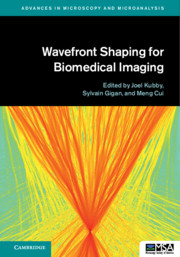Book contents
- Frontmatter
- Dedication
- Contents
- Contributors
- Preface
- Notation
- Part I Adaptive Optical Microscopy for Biological Imaging
- Part II Deep Tissue Microscopy
- Part III Focusing Light through Turbid Media Using the Scattering Matrix
- Part IV Focusing Light through Turbid Media Using Feedback Optimization
- Part V Time Reversal, Optical Phase Conjugation
- Part VI Shaped Beams for Light Sheet Microscopy
- 14 Light Sheet Microscopy with Wavefront-Shaped Beams: Looking Deeper into Objects and Increasing Image Contrast
- 15 Shaped Beams for Light Sheet Imaging and Optical Manipulation
- Part VII Tomography
- Index
- Plate Section
14 - Light Sheet Microscopy with Wavefront-Shaped Beams: Looking Deeper into Objects and Increasing Image Contrast
from Part VI - Shaped Beams for Light Sheet Microscopy
Published online by Cambridge University Press: 10 June 2019
- Frontmatter
- Dedication
- Contents
- Contributors
- Preface
- Notation
- Part I Adaptive Optical Microscopy for Biological Imaging
- Part II Deep Tissue Microscopy
- Part III Focusing Light through Turbid Media Using the Scattering Matrix
- Part IV Focusing Light through Turbid Media Using Feedback Optimization
- Part V Time Reversal, Optical Phase Conjugation
- Part VI Shaped Beams for Light Sheet Microscopy
- 14 Light Sheet Microscopy with Wavefront-Shaped Beams: Looking Deeper into Objects and Increasing Image Contrast
- 15 Shaped Beams for Light Sheet Imaging and Optical Manipulation
- Part VII Tomography
- Index
- Plate Section
Summary
Information
- Type
- Chapter
- Information
- Wavefront Shaping for Biomedical Imaging , pp. 331 - 357Publisher: Cambridge University PressPrint publication year: 2019
